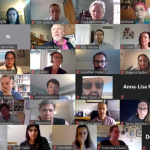In the first weekly digest of 2022, we explore some of the ways that artificial intelligence is transforming science, from improving clinical care to identifying scientific malpractice. We hear about the role of scientific researchers in communicating with the public, and consider the importance of more widespread adoption of an open science mindset. We also share the details of an upcoming webinar on predatory publishing.
To read:
Open data and artificial intelligence to save lives via Financial Times | 6-minute read
Ziad Obermeyer, a physician and machine learning scientist at University of California, Berkeley, launched Nightingale Open Science in December 2021. The platform, which received funding from former Google chief executive Eric Schmidt, contains more than 40 terabytes of medical images, including X-rays, electrocardiograms and pathology specimens from patients with a range of conditions. Using these data with their own computer algorithms, Nightingale Open Science hope to predict medical conditions earlier, triage better and save lives.
Artificial intelligence to spot scientific malpractice via Nature | 8-minute read
To avoid publishing papers with images that have been doctored, several scientific publishers have started using automated software to check manuscripts that have been provisionally accepted after peer review. The software alerts editors of duplicated images, including those that have been rotated, filtered, flipped or stretched. In this article, a number of journals, as well as companies working in this area, share their experiences.
Institutional repositories in East African countries via IASSIST Quarterly | 20-minute read
The authors of this paper explore the growth of institutional repositories in the East Africa region (Kenya, Tanzania and Uganda) from 2010 to 2020. The authors found that although there has been an increase in the number of repositories, growth is slower than in other parts of the world, such as Europe and North America. The results highlight the need for librarians, researchers, government and other stakeholders in the region to work together to overcome the challenges that hinder the growth of repositories.
Scientists as communicators via Science | 5-minute read
This editorial from Holden Thorp, Editor-in-Chief of Science, touches on the importance of and difficulties faced by scientists explaining their work to the public. Holden advocates for trained and specialist science communicators.
On the importance of an open science mindset via Health Psychology and Behavioral Medicine | 14-minute read
This editorial from Martin Hagger, Professor of Health Psychology in Psychological Sciences at University of California, Merced, argues that although there has been enthusiasm for open science in some quarters, and significant progress, open science literacy within the broader scientific community is lagging behind. Martin advocates for researchers to be trained to adopt an open science ‘mindset’ as a central component of their research projects.
What are transformative journals? via Experience Karger | 4-minute read
This blog post offers background on what transformative journals are, how they fit into the broader open access landscape, and their role in making science more open.
To engage with:
Webinar on predatory journals via Amity University
Sumit Narula and Simon Linacre, both of whom are experts in publication ethics, are presenting a webinar on the nature of predatory journals, their history and how to avoid publishing in them. The webinar will be held on 14 January 2022 and will include time for questions.
Open access and COVID-19 via Open Access Scholarly Publishing Association
On 6 December 2021, the Research on Research Institute (RoRI) released a report analysing preprinting, data sharing and peer review practices in COVID-19 papers, and the social and scientific attention these papers have received. In this webinar on 13 January 2022, hosted by Open Access Scholarly Publishing Association (OASPA), the members of RoRI will summarize the approach and evidence that have informed the key recommendations of this report. The webinar will also include other stakeholders, including publishers and early career researchers, to hear their perspectives on the report. You can register for the webinar here.
Welcome to 2022. We are excited to start the year with you and to see where this year takes us!






